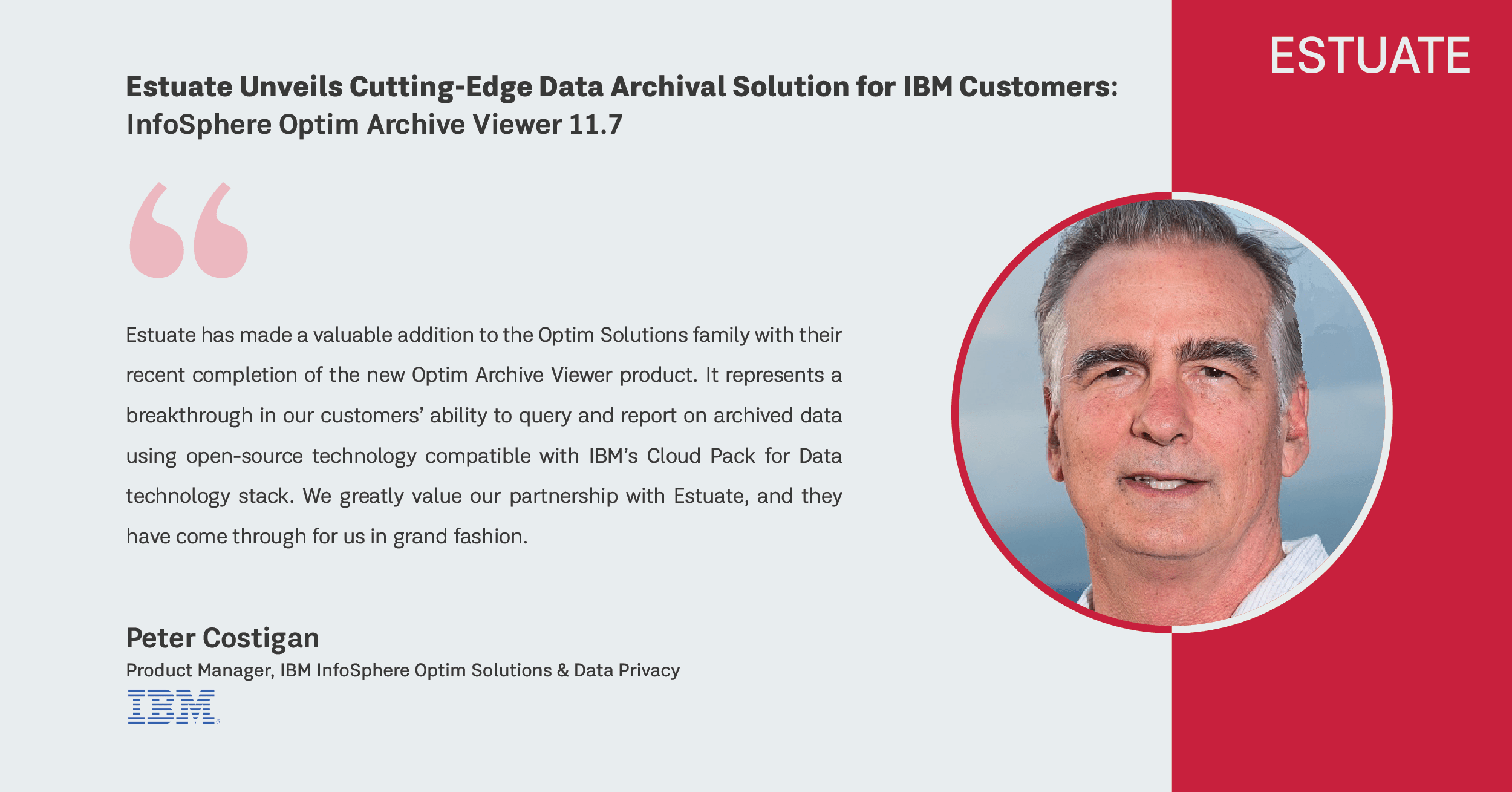Data Archival Made Easy: Estuate’s InfoSphere Optim Archive Viewer 11.7 for IBM Customers
As organizations continue to generate and collect more data than ever, the need for effective data management solutions has become increasingly important. IBM’s InfoSphere Optim Archive family of products addresses this need by managing data from requirements to retirement, boosting performance, empowering collaboration, and improving governance across applications, databases, and platforms.
Managing data properly throughout its lifetime is crucial for organizations to achieve their business goals while minimizing risk. The IBM InfoSphere Optim Archive family of tools is designed to aid this effort by handling older data in active applications and retaining data in retired applications for legal, regulatory, or analytical purposes. With the help of these tools, organizations can ensure their data is properly managed, allowing them to make informed decisions and stay compliant with industry regulations.The latest addition to this family of products is the IBM InfoSphere Optim Archive Viewer 11.7, a powerful and intuitive solution for accessing and analyzing archived data. Developed by Estuate, this product is fully compatible with IBM’s Cloud Pack for Data technology stack, providing organizations with the flexibility and scalability needed to make informed business decisions.
IBM InfoSphere Optim Archive Viewer 11.7 offers several key benefits, including:
- Supporting analytics and data science use cases by converting archive data to an open-source, compressed, columnar file format.
- Performing simple to complex queries using an open-source query engine, either through the query tool bundled with the viewer or through third-party tools that use ODBC or JDBC connectivity.
- Offering an efficient columnar file organization that eliminates the need for performance tuning through indexes or other DBMS performance artifacts.
- Providing flexibility to be used on its own or in a hybrid solution, in which queries can access data from the InfoSphere Optim Archive Viewer and IBM InfoSphere Optim Open Data Manager.
IBM InfoSphere Optim Archive Viewer automates several processes, such as:
- Converting Optim Archive File data to a new open-source, compressed, columnar file format
- Managing the definition and retention of metadata
- Facilitating open ODBC or JDBC query access to the data through an open-source query engine
- Managing user access to the InfoSphere Optim Archive Viewer
IBM InfoSphere Optim Archive Viewer continues to provide the robust data archiving capabilities of the IBM InfoSphere Optim Archive. It offers features such as:
- Validates the legally defensible immutability of archived data through a validation utility.
- Supports the schema evolution of archived data over time.
- Allows for the defensible deletion of part or all of the data according to retention policies.
- Utilizes data retention date support for each archive file through manual or automated purging.
- Stores and queries archived data on various storage devices, both on-premises and in the cloud.
- Offers a new Processor Unit Value (PVU) option for organizations with IBM Optim Archive Enterprise Edition – Archive File Access, which delivers pricing consistency across IBM InfoSphere Optim solutions.

With the release of the IBM InfoSphere Optim Archive Viewer 11.7, organizations can now benefit from a powerful and intuitive solution for managing their archived data. IBM’s partnership with Estuate has allowed them to deliver a fully compatible product with IBM’s Cloud Pack for Data technology stack, providing organizations with the flexibility and scalability they need to make informed decisions based on their archived data.
In conclusion, the IBM InfoSphere Optim Archive Viewer 11.7 is a powerful and intuitive solution for managing archived data. Estuate delivered a fully compatible product with IBM’s Cloud Pack for Data technology stack, providing organizations with the flexibility and scalability they need to make informed decisions based on their archived data.